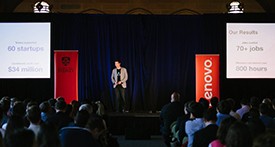Incubate is a startup accelerator and entrepreneur events program developed by the University of Sydney Union. We recently caught up with James Alexander, co-founder of Incubate to get the inside word on how it all works.
Do you tend to see similar startup ideas coming through?
James:
We do yes, primarily due to the University context. Because we’re working with a student community predominantly, that mindset does come through into Incubate applications.
In fact, there are three ideas we see almost without fail! One is an idea to make finding student internships and landing jobs easier. Another is an app to help students find and make friends on campus. And finally, we often see a time tabling app to help schedule life, study and everything else. Now, it’s very, very difficult to get into Incubate with one of these ideas. Not because they’re not original, more so it’s because these businesses don’t work for a variety of reasons. We’ve seen them over and over again, and we know why they fail. So the founder would need a unique insight as to why their version will solve this particular problem.
We noticed more female co-founders are part of Incubate this time around. Any reason for this?
James:
It’s interesting, we certainly noticed over time there were less applications from women compared to men. I think the research supports the fact that males tend to be more confident in trumping their skills, whereas females feel less of a need to talk up or over-inflate their confidence. That’s why, now, every time we come across female entrepreneurs, rather than trying to meet an Incubate ‘quota’ specifically, we’re just really encouraging. We ask women to apply, really encouraging them to ‘have a go – because even if you don’t get in, you’ll get tons of valuable feedback’. I think this process has definitely helped us increase our female program participants.
Is there a specific skill-set that takes precedence?
James:
If we have a bias, it’s usually going to be towards software engineering and computer science kind of students, especially those with outgoing and business entrepreneurial tendencies. This is all about what these subject areas bring to the startup. We often see students apply with an idea, but no concrete way of executing on it. So we do prefer students that can execute, whether they can build the technology themselves, or the fact they have a software or engineering co-founder on the team.
What’s your view on whether students should begin with a startup straight away, versus getting experience working for a company first?
James:
Basically, there are two schools of thought on this. Whether you should go out there, join the workforce and get experience first… or whether you should just dive into your startup idea right away. As you’d expect, there are pros and cons with both methods.
If you go and get some experience first, you’ll learn from people who have done it before – and that’s a positive. My major caveat here, however, is to make sure it’s the right environment. A lot of graduates get this wrong by entering a large enterprise style of setting where there tends to be less innovation with the team they’re joining. The issue here is the graduate isn’t super passionate about the business, and the work experience itself won’t
usually add a lot of value to their career as an entrepreneur. A better move – if getting experience first is the objective – is to join a growth company. This means a smaller, high-growth business that’s innovating a product or service. Optimally, you’d want them to be funded or self-funded, and have customers and a solid team in place. Now, this may be easier said than done, but a graduate will learn so much more in this environment compared to a large enterprise team.
The other school of thought is to skip this step, and just jump into doing a startup instead. The pros are that you’ll learn a lot, and you’ll learn it fast. This is simply because you’ll wear multiple hats and take on a lot of responsibility for the business and for your customers too. You become more mature faster, gaining a broad perspective on building businesses, while acquiring an insight into broader society and the problems we’re all trying to solve. The main
critique (or caveat) with this approach hinges on the quality of the startup. If the business isn’t based on a strong idea, or doesn’t really have funding or customers in place, the learning curve for the graduate could be very slow, or even non-existent.
So yes, there’s risks on both sides. Generally, I tell graduates if they have a burning idea and problem they think they can solve, they’ll intuitively know the right path or decision: which is often that they should do a startup. If not, then look for a really innovative company they admire, and try and get a job with them for some valuable experience.
Learn more:
We hope you enjoyed the interview with James Alexander from Incubate. To find out more about the program, visit https://incubate.org.au/.
















